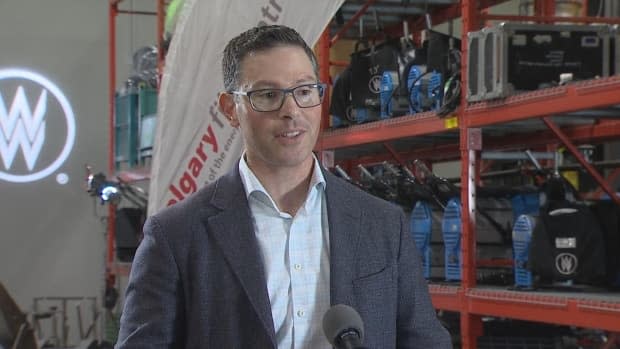Alberta launches tour to pitch province to investors in the rest of Canada and beyond

Jobs, Economy and Innovation Minister Doug Schweitzer has kicked off a national tour to try to pitch Alberta as a place to do business — but the work won't stop at Canada's borders.
The minister is doing virtual engagement sessions with investors, business chambers and companies to try to sell them on why the province is on the economic upswing and a worthwhile location to invest.
"We want to make sure we go and put our best foot forward to people across the country," he told CBC News.
"We've got to try and present that broad picture for where Alberta is in our plan going forward, of that business-friendly investment environment for job creation."
The first pillar of the strategy is to target organizations with investment dollars in sectors like energy, forestry, agriculture and tech. The second is to sell Alberta as an affordable, beautiful place to live to entice employees to make the move.
On Tuesday, the tour started as he spoke to the Canadian Club in Toronto, and the appearances will eventually expand to international firms and chambers as well.
Government efforts have been focused inside Alberta for the last two months, but now Schweitzer says it's time to battle some of the misconceptions people have about the province's economy and efforts to diversify.
"You have to break down the occasional stereotype based on what Alberta is all about," Schweitzer said.
"You walk them through all the exciting opportunities that are happening here in our province. For many of them, it's the first time that they've heard it."
Alberta isn't back to its former economic glory yet, despite the minister's pitch.
The broadest measure of economic activity — total labour compensation — suggests every province has recovered and exceeded pre-COVID levels except Alberta, which is still three per cent lower than before the pandemic.
"What I would suggest the government pursue in terms of its marketing is to not try and pick winners or losers or target specific sectors or specific companies," said Trevor Tombe, an economist at the University of Calgary.
"It's not a sustainable source of economic growth. So I would encourage the government to focus on the fundamentals of Alberta."
Tombe's analysis of those labour compensation figures indicate that if Alberta's economy grew with the rest of Canada, total earnings would be approximately $1 billion per month higher.
One reason for the low numbers is the drop in oil and gas prices last spring. Still, Tombe says there's some optimism, as industries like food, tourism and accommodations start to experience their rebounds.
Schweitzer sees an opportunity to shift the province's economy.
"You've got Denver, you've got other cities that have had to reinvent themselves and economies have had to reinvent themselves in many different ways and build on their foundation. And people are starting to really believe again that Alberta has that opportunity."
The minister has events scheduled throughout the month, from presentations at major banks to the Toronto Board of Trade.

